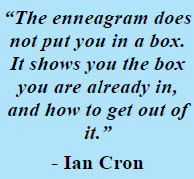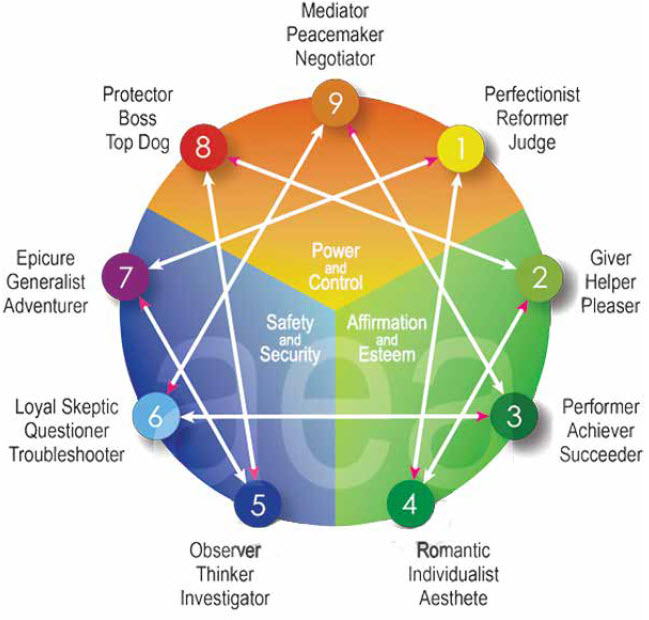The Enneagram
 By: Lisa Philippart
By: Lisa Philippart

What I love most about being a counselor is learning from my clients. Lately, I have been working with young people, especially millennials, who share their enneagram numbers with me. Initially, I knew nothing about enneagrams, but I have found that like other personality tests, a discussion of our “types” often opens doors for conversation and insight. The enneagram can be a powerful gateway to self-awareness and understanding of others, by describing the structure and dynamics of nine personality types. Stemming from the Greek words ennea (nine) and grammos (a written symbol,) the nine-pointed enneagram symbol represents nine patterns of thinking, feeling, and acting that arise from a deeper inner motivation or worldview. The enneagram describes three centers of intelligence and perception: head, heart, and body. While all of us have all three centers, our personality type has a particular strength and “home base” in one of them. The Instinctual Center (body) includes numbers 8 (the protector,) 9 (the mediator,) and 1 (the perfectionist.) The Emotional Center (heart) includes numbers 2 (the giver,) 3 (the performer,) and 4 (the romantic.) The Intellectual Center (head) includes numbers 5 (the observer,) 6 (the loyal skeptic,) and 7 (the enthusiast.)

 Body Types: 1, 8, and 9
Body Types: 1, 8, and 9
Type 1: The Perfectionist’s attention goes toward seeing and correcting what is wrong, and doing the right thing. They are honest, responsible and detail-oriented while having high standards, ones can be critical, resentful, and non-adaptable.
Type 8: The Protector tends to take charge of situations. They are energetic, intense, occasionally intimidating, impatient, and justice-seeking. The challenge for eights is to combine assertion and control with interdependency and cooperation.
Type 9: The Mediator is balanced, accepting, and harmonious. Nines are willing to do what needs to be done while taking care of themselves in the process. They see all points of view, but can also be stubborn, ambivalent, and conflict avoidant.
Heart Types: 2, 3, and 4
Type 2: The Giver focuses on relationships, making connections, and empathizing with the needs and feelings of others. They are caring, often popular, and excellent communicators. Twos struggle with being naïve, dependent, and people-pleasing.
Type 3: The Performer channels their emotional energy into getting things done. Threes are enthusiastic, successful high achievers. The struggles for threes include overworking, impatience, and concentrating on external rewards to keep up their image.
Type 4: The Romantic moves back and forth between seeking meaning and depth in relationships and being individualists needing their alone time. They are compassionate and idealistic, which creates problems with their ability to cooperate and avoid melancholy. Head Types: 5, 6, and 7
Type 5: The Observer focuses on intellectual understanding and accumulating knowledge. Their strengths include their analytical abilities, perceptiveness, and self-reliance. While fives value their privacy, they may become isolated or spend too much time “up in their heads.”
Type 6: The Loyal Skeptic uses perception and intellect to understand others and the world. They are protectors, courageous, and strategic thinkers. Because of their loyalty to those in their circle, they often view outsiders with suspicion and pessimism.
Type7: The Enthusiasts are the forward thinkers and movers. These optimists love adventures, and are fun-loving, quick-thinking communicators. Sevens’ attention can shift quickly, so they are often seen as dispersed, uncommitted, and even self-absorbed.
If you would like to learn more about the enneagram, go to:
www.enneagraminstitute.com
By: Lisa Philippart
Licensed Professional Counselor